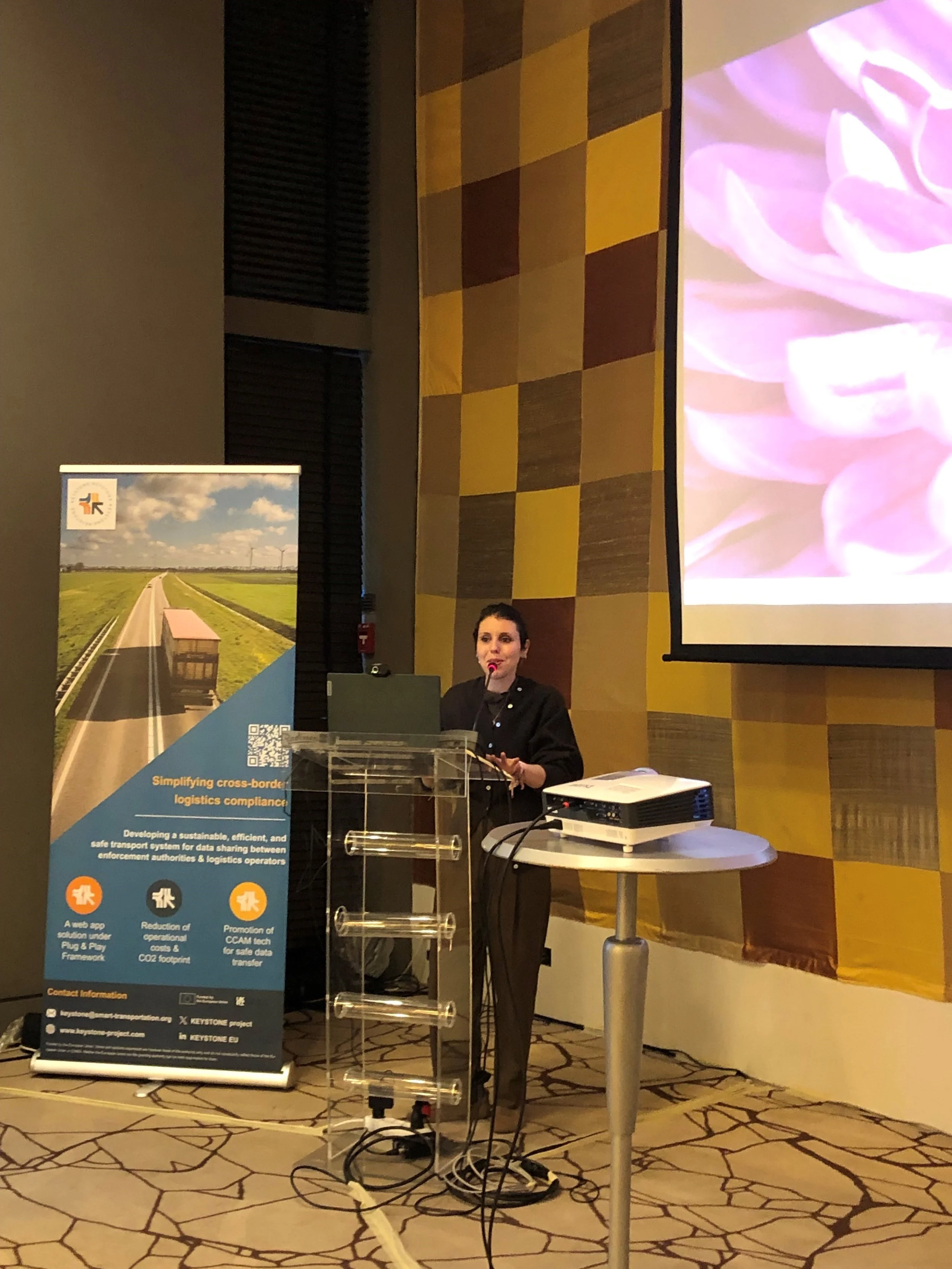Key Takeaways from KEYSTONE Project Workshop
Participants at the KEYSTONE Workshop in Athens, Greece, on 2 December 2024.
On 2 December 2024, the KEYSTONE Project hosted a workshop at the Radisson Blu Hotel in Athens, Greece, alongside the project’s 4th Steering Committee Meeting. The workshop was organised by Aethon Engineering, a project partner of KEYSTONE and brought together not only KEYSTONE project partners but also representatives from EU-funded initiatives, freight terminal stakeholders, logistics professionals, personnel from enforcement authorities and European Commission representatives. The workshop served as a platform for discussing the latest advancements in transport digitisation and interoperability, as well as exploring opportunities for collaboration among EU projects.
Mr Miguel Cabrera, Policy Officer at the Director General for Mobility and Transport (DG MOVE), attended the workshop and shared insights on the European vision for a more efficient and sustainable transport and logistics sector.
Attendees:
Participants at the KEYSTONE Workshop in Athens, Greece, on 2 December 2024.
Mr Ibrahim Sewidan (EY Consulting) - SEDEA Project
Mr Luis Gallego Vilches (EY Consulting) - SEDEA Project
Mr Jerzy Jasionek (EY Consulting) - SEDEA Project
Mr Oleksandr Butyrin (EY Consulting) - SEDEA Project
Mr Anthony Dragone (EY Consulting) -SEDEA Project
Mr Rudy Hemeleers (51biz) - eFTI4EU Project
Mrs Ivana Norac-Kevo (AKD)- SOTAH-AFFINIS Projects
Dr Mateo Crnkovic (AKD) - SOTAH-AFFINIS Projects
Mr Jure Sertić (AKD) - SOTAH-AFFINIS Projects
Ms Adela Jelinek Bišćan (AKD) - SOTAH-AFFINIS Projects
Mr Mario Hodak (AKD) - SOTAH-AFFINIS Projects
Mr Ivan Ljubičić (AKD) - SOTAH-AFFINIS Projects
Mrs Maria Stavara (CERTH-HIT) - NAPCORE Project
Dr Beatriz Martínez-Pastor (University College Dublin) - SETO Project
Second Lieutenant Mr Ioannis Niros (Road Traffic Police of Athens)
Dr Vasilis Sourlas (ICCS) - CCAM Project
Mr Simone Pacciardi (Port of La Spezia)
Highlights from the Workshop
Dr Mauro del Amico, from KEYSTONE Project Coordinator University of Modena and Reggio Emilia (UNIMORE), opened the workshop. He emphasised the importance of digitising transport and logistics to simplify cross-border operations and create a safer, more secure, seamless, and smarter ecosystem. The need for a federation to unite EU initiatives in advancing interoperability and digitisation was highlighted during his speech.
Mr Cabrera (DG MOVE) delivered a keynote speech at the KEYSTONE Workshop in Athens, Greece, on 2 December 2024.
Mr Miguel Cabrera underscored the alignment of EU-funded projects like KEYSTONE with the EU's 2030 goal for paperless transport, highlighting the sector's role in sustainability and economic competitiveness. Additionally, the need for synergies across projects and the adoption of digital tools was emphasised, given the transport sector’s significant contribution to the EU economy.
Project Presentations:
SETO Project:: Dr Beatriz Martínez-Pastor (University College Dublin) presented SETO, the sister project of KEYSTONE, which seeks to enhance the efficiency of transport operators and enforcement authorities through a seamless digital platform. SETO is aiming to incorporate advanced digital technologies, such as Weigh in Motion (WIM), to optimise operations. Two real-world tests will take place in Bordeaux and Belgium, aiming to provide valuable feedback for broader implementation.
SEDEA Project: Introduced by Mr Ibrahim Sewidan (EY Consulting), SEDEA focuses on developing a smart enforcement model for EU transport compliance. By integrating real-time data securely and efficiently, the project demonstrates how enforcement processes can be streamlined to enhance cross-border efficiency and safety.
eFTI4EU Project: Mr Rudy Hemeleers (51biz) highlighted the project’s progress under the eFTI Regulation, showcasing data-sharing solutions that promote collaboration among logistics providers, shippers, and authorities. Discussions centred on how these advancements - including real-time tracking and reduced administrative burdens - could be adopted EU-wide to foster compliance and operational efficiency.
SOTAH-AFFINIS Projects: Dr Mateo Crnković, Mr Ivan Ljubičić, and Mrs Ivana Norac Kevo (AKD) detailed the SOTAH system’s role in simplifying cross-border data exchange by processing tachograph data. Building on this, the AFFINIS Project integrates additional national records to enhance road safety and optimise transport operations, offering a scalable model for EU-wide adoption.
Mr Zoe Petrakou (AETHON Engineering) moderated the round table discussion at the KEYSTONE Workshop in Athens, Greece, on 2 December 2024.
Round Table Discussion: Moderated by Mr Zoe Petrakou (Aethon Engineering), the discussion covered key topics such as interoperability, security, fraud prevention, stakeholder needs, and the alignment of EU initiatives. The stakeholders stressed the importance of secure, interoperable systems and the importance for real-time data. Mr Ioannis Niros (Road Traffic Police of Athens) highlighted the need for a single data entry point to streamline logistics checks, particularly for enforcement officers conducting on-site inspections. The challenges of tachograph manipulations and data fraud were also discussed extensively.
Following, Mr Simone Pacciardi (Port of La Spezia), emphasised the necessity of consolidated transport data to enhance operational planning. Additionally, Mr Mylonas Chrisostomos (CERTH-HIT) and Dr Vasilis Sourlas (ICCS) discussed how integrating emerging technologies can tackle real-world constraints and highlighted the importance of API standardisation—a key aim of the KEYSTONE Project.
Interactive Survey and Key Outcomes: All workshop participants participated in 2 different surveys - one previous to the meeting online, and one live on-site to identify critical challenges, opportunities, and areas for future focus. Below are some of the key issues discussed and the findings:
Key Drivers for Adoption: Interoperability, ease of use, incentives (time and cost savings), sustainability, and legislative support were identified as crucial factors.
Gaps in the Ecosystem: All participants highlighted the need for real-time data, interoperability, process standardisation, and unified platforms. The technological readiness gap between small and large logistics companies was also noted as a barrier.
Barriers to Implementation: Interoperable data standards and regulatory hurdles were seen as the most significant challenges, followed by resource limitations and technological readiness.
Recommendations: Dissemination, awareness-raising, and fostering cross-project collaboration were deemed essential to avoid duplication of efforts. Simplicity, scalability, and economic sustainability were highlighted as critical success factors.
Conclusion
The workshop fostered a sense of alignment and collaboration among stakeholders, showcasing the progress made in advancing the digitisation of transport and logistics. Attendees left inspired and ready to continue their efforts towards achieving a greener transition in transport and logistics.
Next Steps: To maintain momentum, all participants emphasised the importance of aligning forces to work together towards sustainable and innovative transport solutions, leveraging digital technologies to transform the industry.
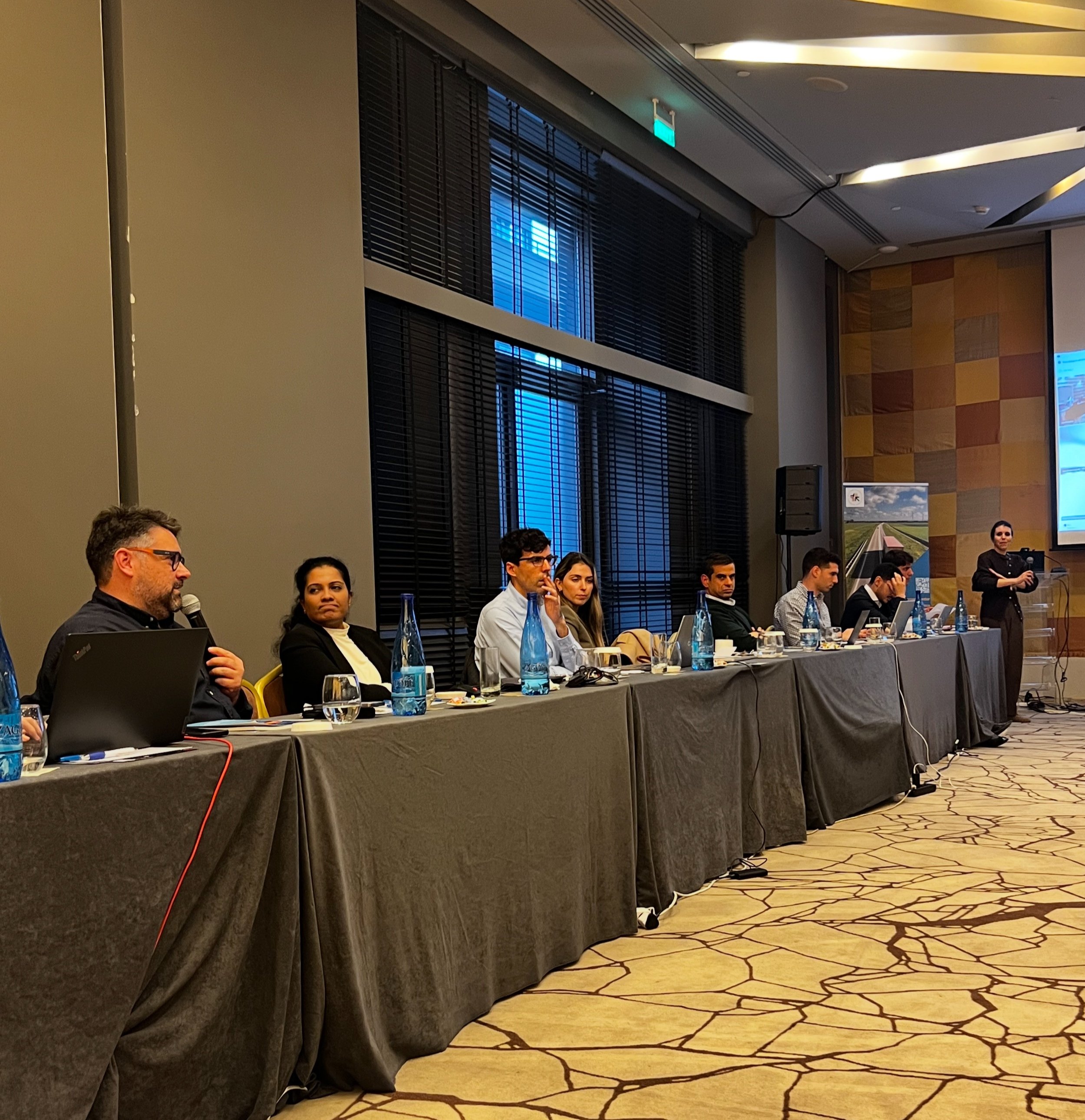
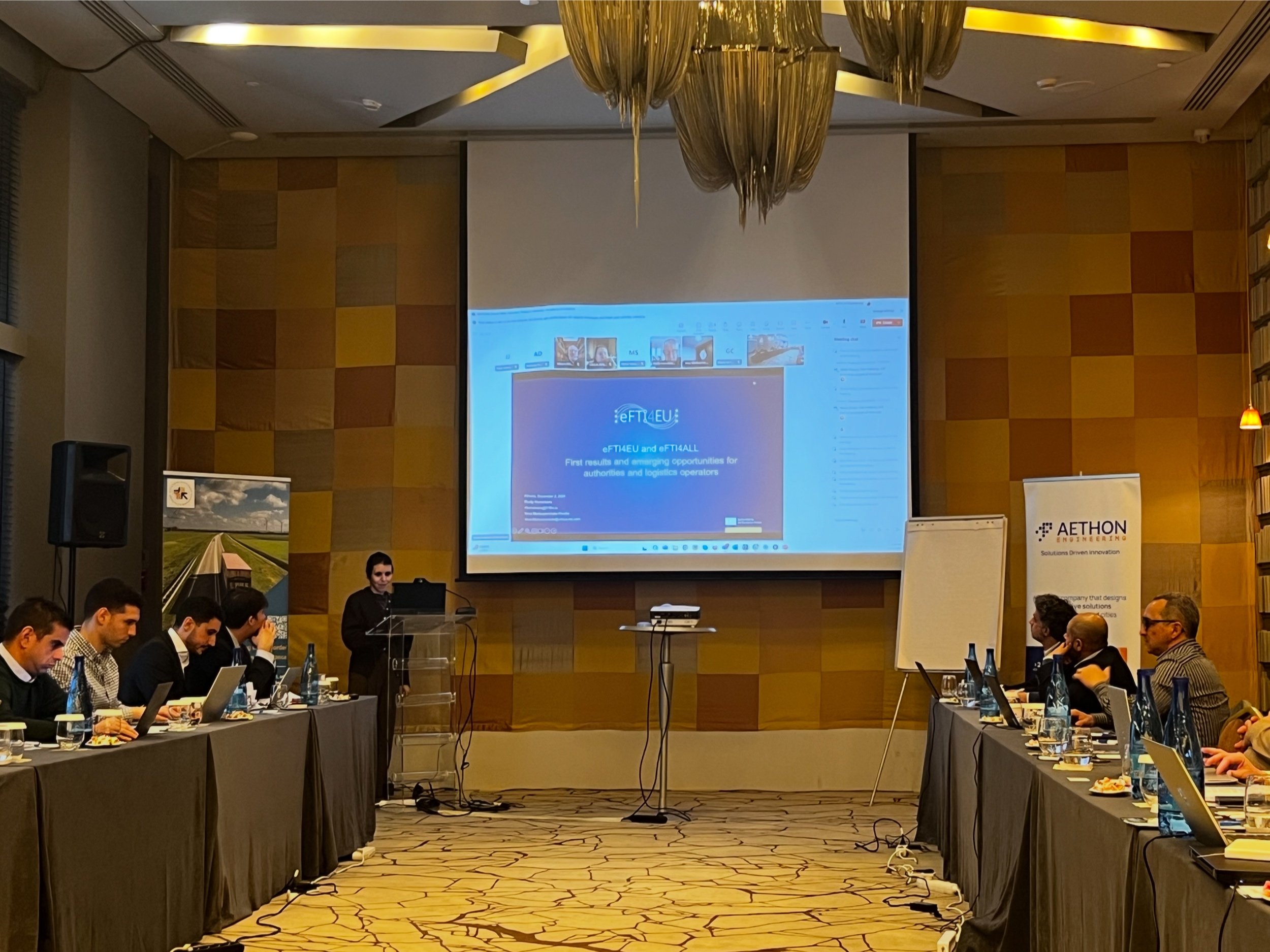
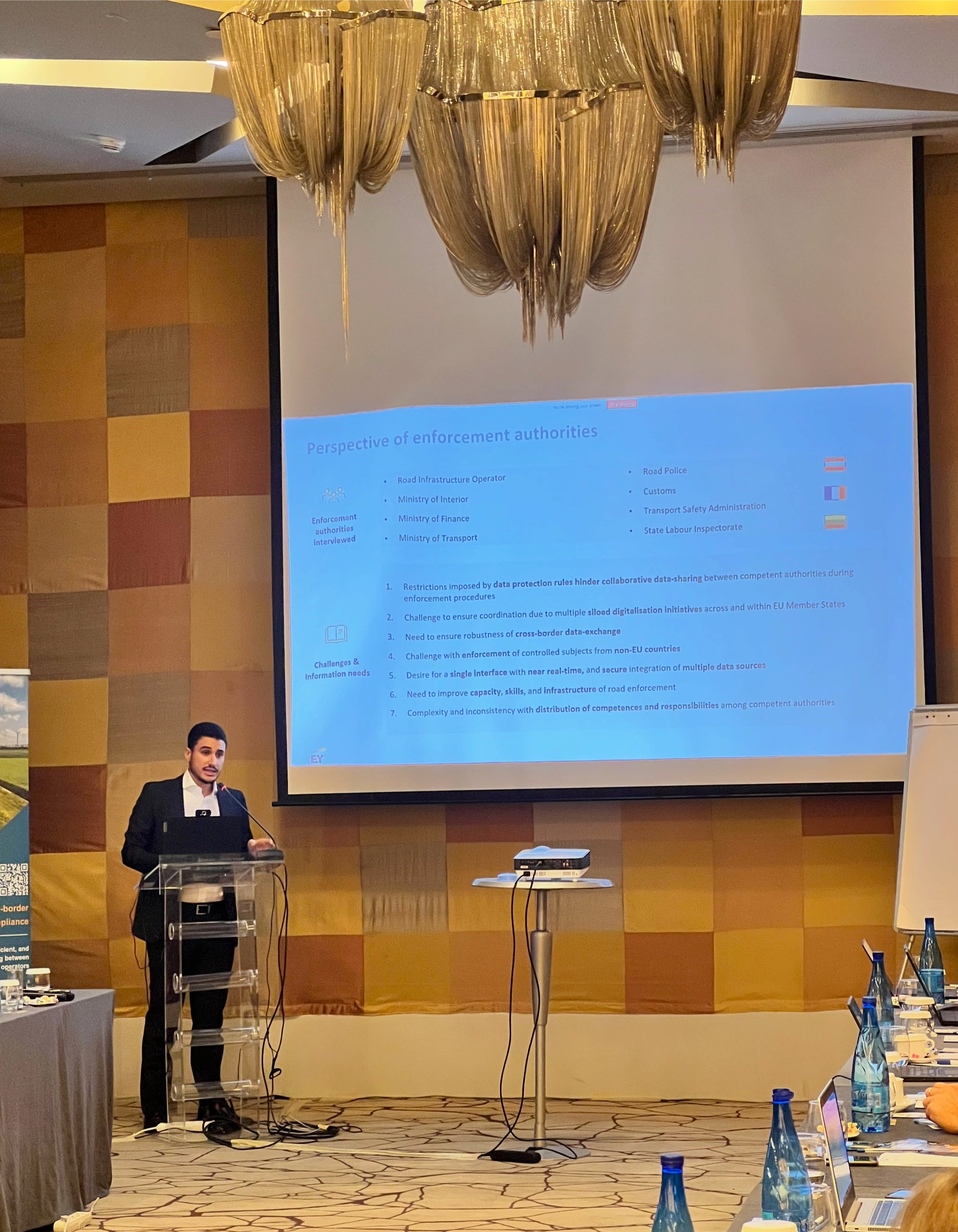
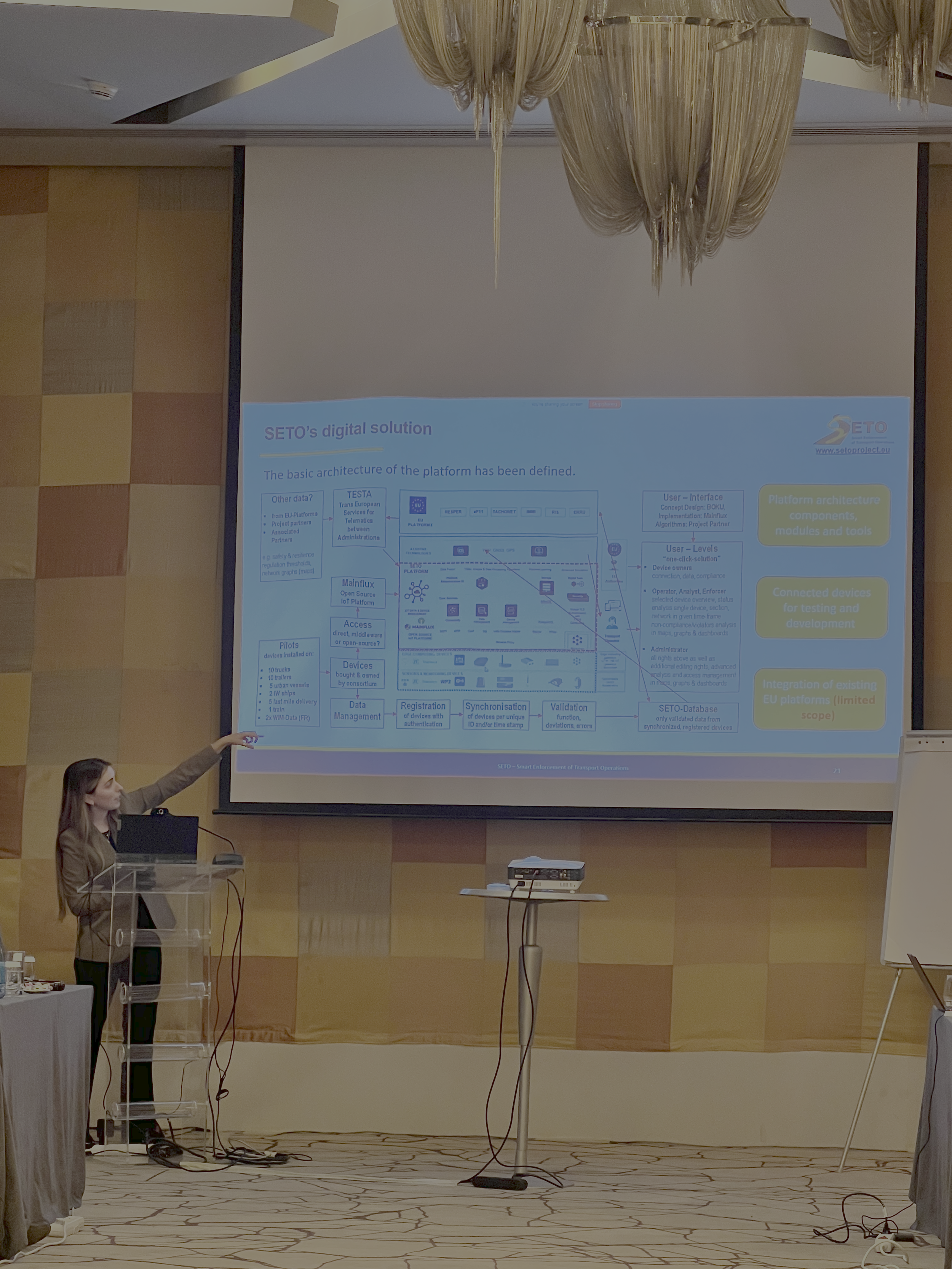
Author: Eftychia Koliou, Smart Transportation Alliance (STA)





